Over the years, camping has undergone substantial change, and solar panels have gained considerable traction as an accessory for camp installations. Tourists can use solar panels on top of the car. Alternatively, roll-up “solar blankets” or mobile panels can be used, which can be deployed anywhere they can collect more sunlight. This is primarily attributable to solar technology advancements and increased awareness of renewable energy sources.
Solar panels for camping are a game-changer. It facilitates the charging of campers’ devices and equipment, thereby augmenting the camping experience and offering convenience. No longer does camping entail a sense of detachment from the outside world. Solar panels for campers allow modern travelers to appreciate the tranquility of nature while still having access to contemporary conveniences.
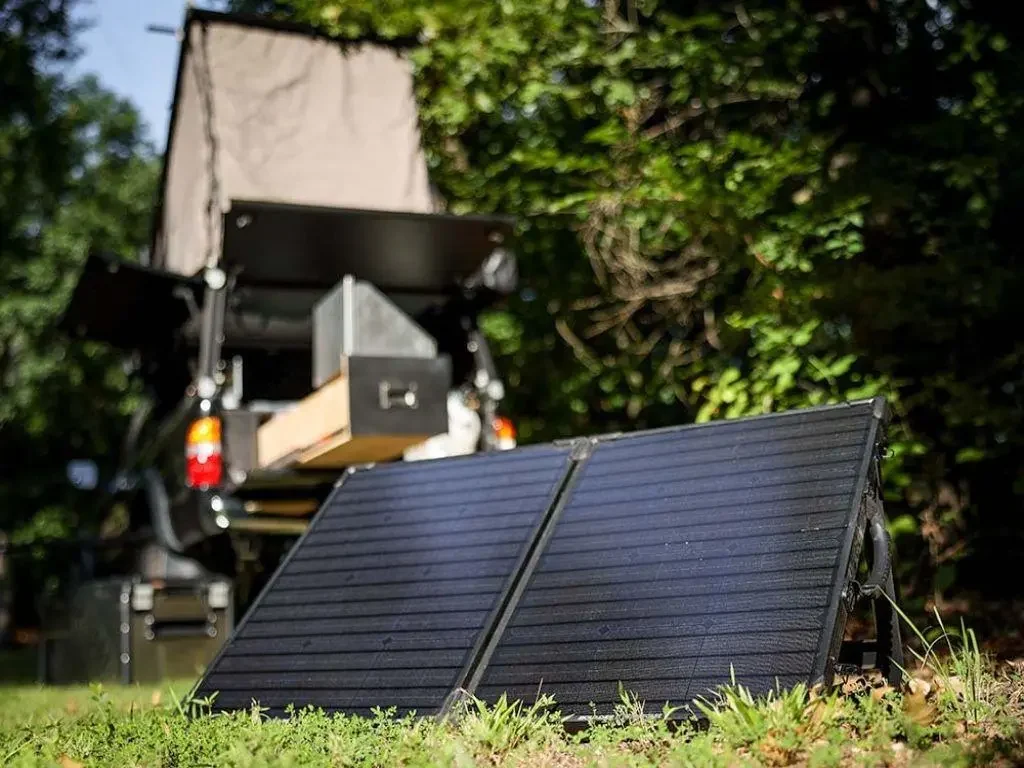
Source: Take The Truck
The increasing practicality of solar panels in the context of camping emerged in the early 2000s. A report by the Solar Energy Industries Association indicates that over the past decade, the solar industry experienced an average annual growth rate of 24%. This expansion occurred concurrently with an influx of environmentally aware campers who were in search of more sustainable energy sources for their camping excursions.
With so many options available, selecting the most suitable solar panels for a camping setup can be difficult. This article intends to assist you in making an informed choice that will guarantee a productive, environmentally conscious, and pleasurable camping experience.
How Solar Panels for Camping Work
Camping with solar panels is an environmentally responsible option. From laptops and refrigerators to lighting and fans, they are capable of powering a variety of devices. The capacity of solar panels for camping to produce electricity is contingent upon a multitude of factors, encompassing panel dimensions, solar radiation exposure, inverter and battery efficacy, and so forth. The solar panel algorithm is outlined below:
- Absorption of sunlight: the mechanism by which solar panels function begins with the absorption of sunlight. Energy is converted from sunlight into electricity by solar panels, also known as photovoltaic panels. Composed of multiple layers of boron, silicon, and phosphorus, the solar cells comprise the vast majority of the panels. Elevated electron motion and the production of an electric current ensue from the excitation of electrons by sunlight striking these cells.
- The transformative effect of sunlight on electricity: the resultant electricity is produced in direct current (DC) configuration, which is generally incompatible with the functionality of most camping equipment. To power camping equipment, this DC electricity is therefore converted to alternating current (AC) using an inverter.
- Energy storage: the power produced by the solar panels throughout the day can be mechanically retained in a battery or portable power station. When the sun is not visible, such as at night, this conserved energy can be utilized to power devices.
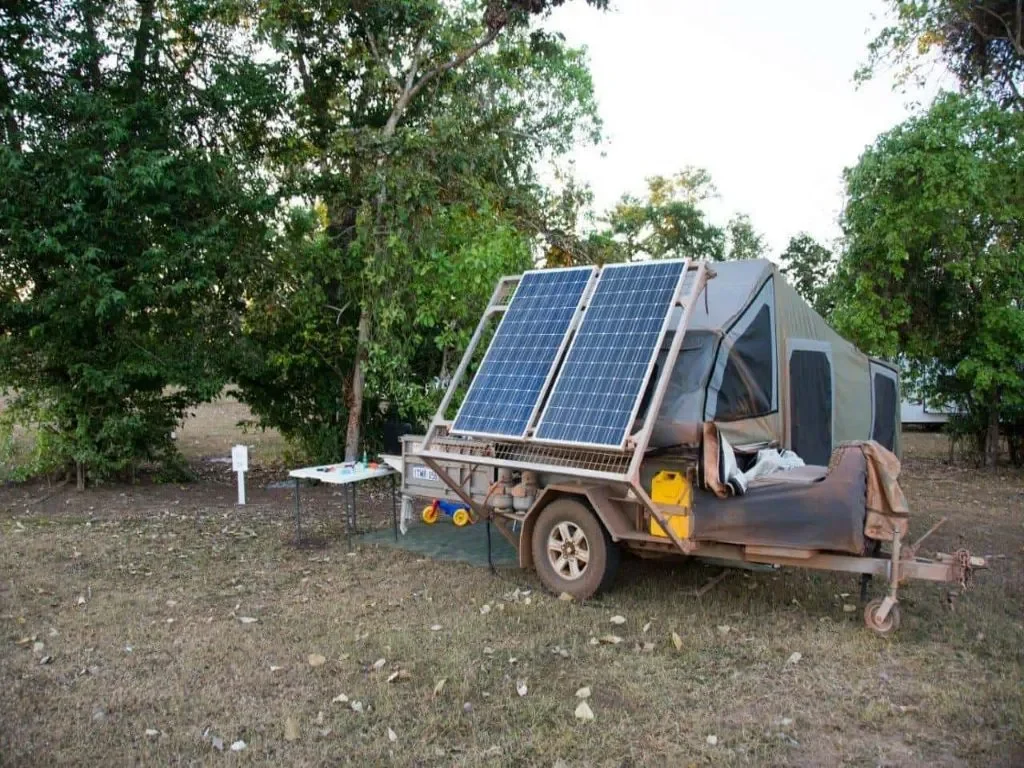
Source: 4WDing Australia
Sunlight exposure throughout the day and the wattage of the solar panels are two important factors to take into consideration when calculating the total output each day. A 250-watt solar panel operating at peak efficacy for seven hours per day can generate an average of 1.75 kWh of energy.
You can choose the most suitable solar panel for your requirements with greater knowledge of their operation. Bear in mind that a lifetime of camping excursions can be secured by making an investment in a solar panel of superior quality.
Types of Solar Panels for Camping
Understanding the fundamental varieties is crucial when it comes to choosing the most effective solar panels for a campground. We will examine monocrystalline, polycrystalline, and thin-film solar panels, which are the three primary varieties of solar panel camping.
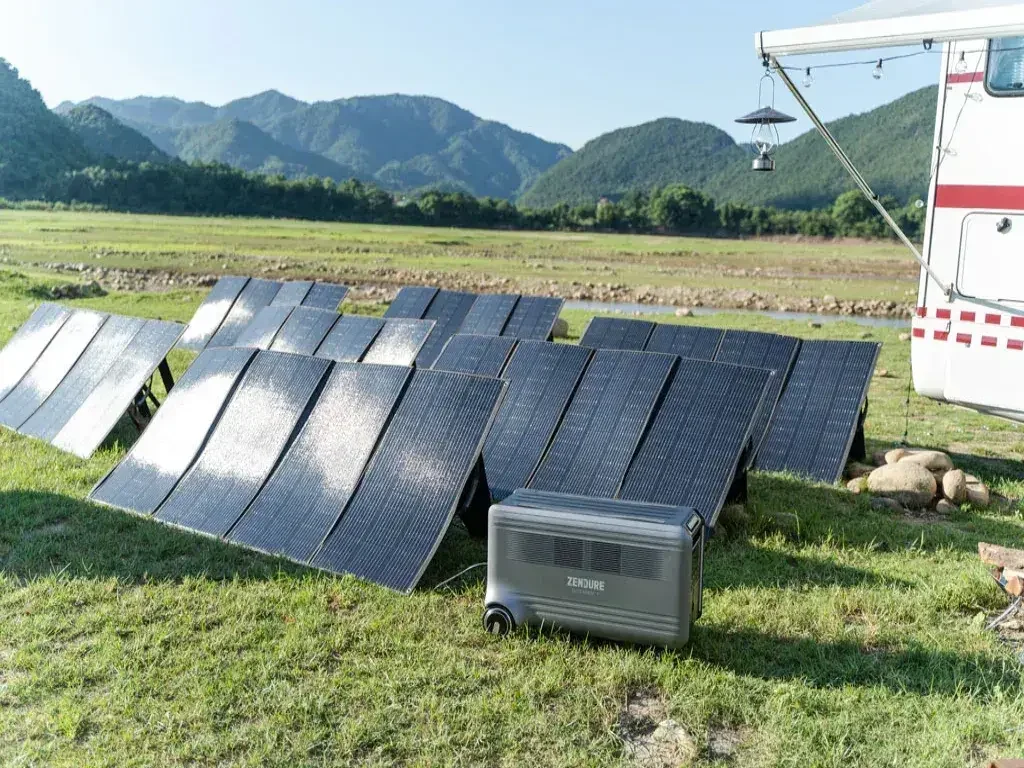
Source: ZENDURE
Monocrystalline Solar Panels
Over 20% of sunlight is converted into usable energy by monocrystalline solar panels, the most efficient form. Succinctly arranged crystals afford electrons increased mobility, consequently facilitating increased electricity generation. A uniform appearance and black coloration readily identify these panels. Nevertheless, they represent a substantial financial commitment due to their exorbitant cost.
Polycrystalline Solar Panels
Campers frequently opt for polycrystalline panels due to their distinctive blue hue. Their efficacy is typically 15–17%, a little lower than that of monocrystalline panels due to the multiple crystal structures they comprise. Although they are more affordable, many outdoor enthusiasts can consider them a budget-friendly alternative.
Thin-Film Solar Panels
For camping, thin-film solar panels, which are the lightest and most portable option, are optimal. They are manufactured by depositing one or more photovoltaic material films onto a substrate (such as copper, cadmium, or silicon). Significantly inferior to the other two varieties, these panels have an efficacy range of 10–12%. In contrast, they are favored for transient arrangements such as camping excursions due to their portability and reduced price.
Your specific requirements must be taken into account when selecting a solar panel for camping.
- Monocrystalline panels are the most viable option when cost is not an issue and prioritize efficiency
- Polycrystalline panels are an astounding option if you are seeking a compromise between cost and performance
- Thin-film panels are the optimal choice if cost and portability are the primary considerations.
How To Use Solar Panels for Camping
Campers may choose from three primary varieties of solar panels: flexible solar panels, rigid solar panels, or portable solar panels.
- Portable solar panels: these solar panels for camping are conceptualized with portability in mind, as their name implies. They are ideal for solitary travelers and backpackers due to their portability, compactness, and ease of assembly. Smartphones, GPS devices, and cameras can be charged efficiently despite their diminutive size. Certain models can generate as much as 100 watts of power, which is sufficient to operate a compact camping refrigerator.
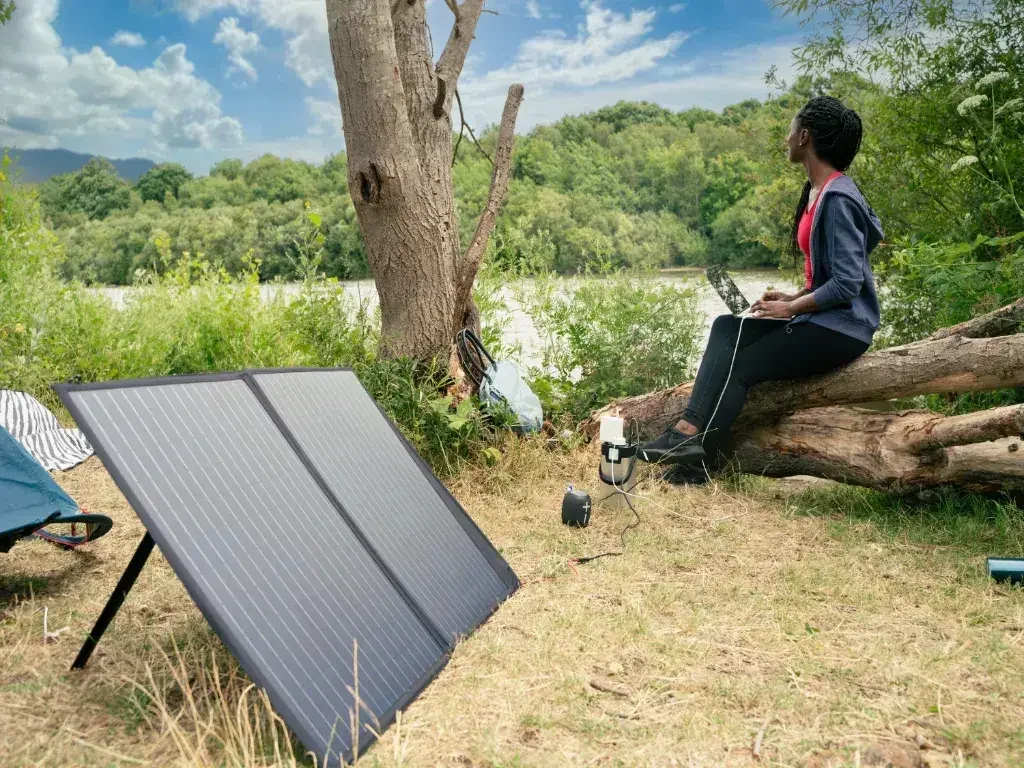
Source: Solar Panels London
- Rigid solar panels: these solar panels for camping are the conventional type. They are considerably more resilient and long-lasting, in addition to being exceptionally energy efficient. Family camping excursions and RV camping, where more power is required, are ideal locations for rigid solar panels. Power output ranging from 100 to 400 watts is sufficient to supply energy to larger electronic devices such as televisions, laptops, and even small appliances.
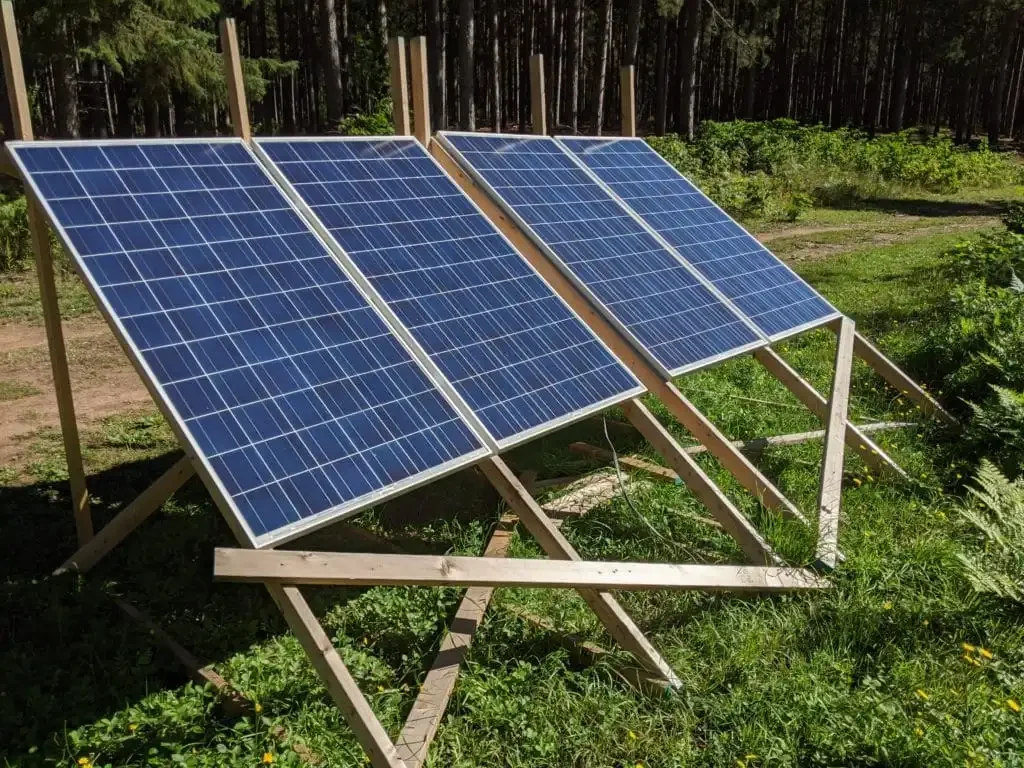
Source: Battle Born Batteries
- Flexible solar panels: these solar panels for camping provide a combination of portability and output. They are simple to install on curved rooftops of RVs or irregular surfaces due to their 30-degree bending capability and lightweight construction. Their maximum power output of 160 watts qualifies them for an extensive array of camping applications.
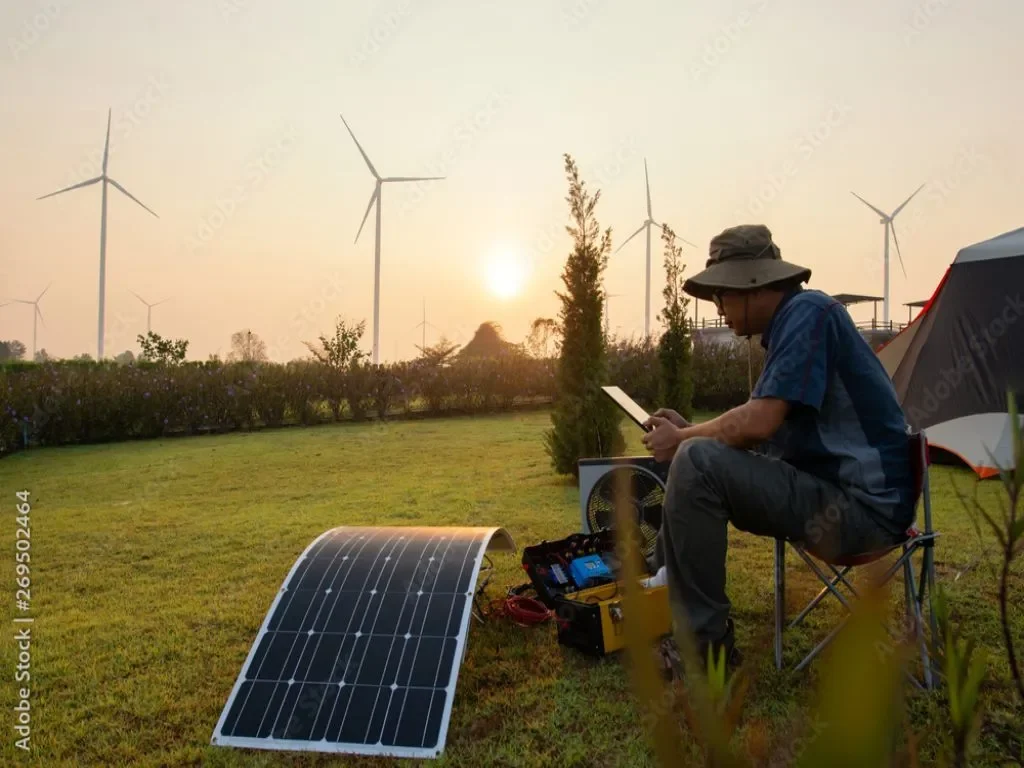
Source: Adobe Stock
Consider variables such as the quantity of energy required, the camping type (RV camping, backpacking, etc.), and the solar panel’s durability to make an informed choice. In regard to camping, it is imperative to select a solar panel that is optimal for one’s particular requirements and conditions.
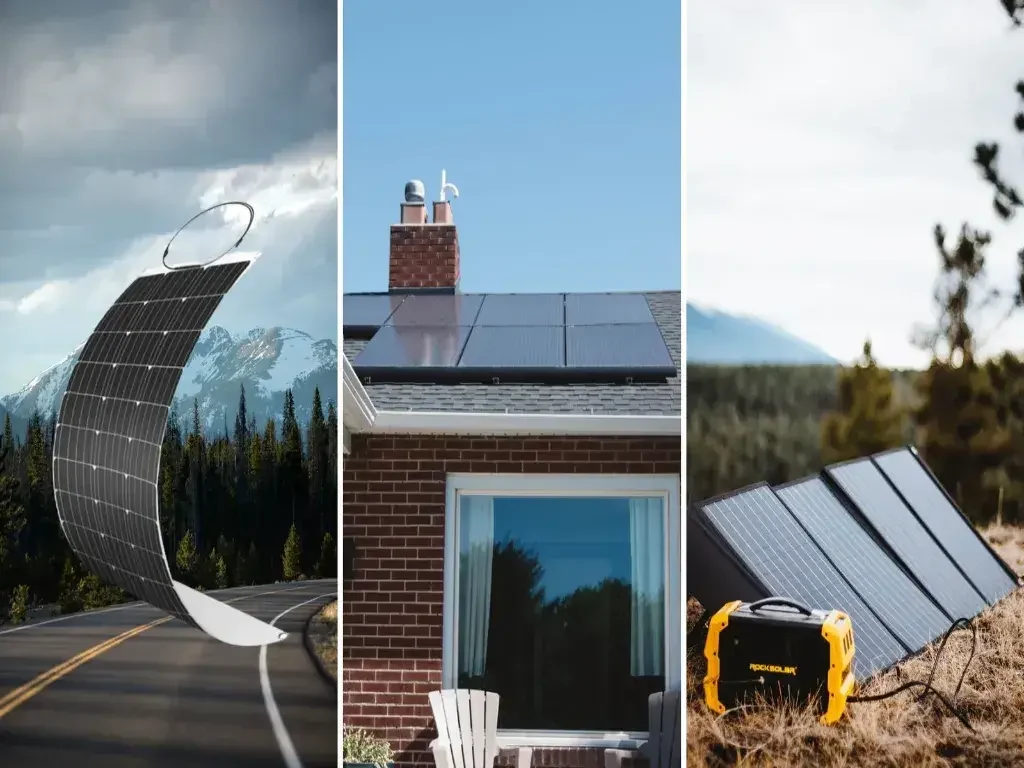
Source: Rocksolar
Solar panels can, therefore, enhance the comfort and convenience of camping for anyone, from a family traveling in an RV to an individual backpacker.
What Size Solar Panel Do You Need for Camping?
Selecting an appropriate solar panel size for camping can be a challenging endeavor. Here are the most important considerations:
- Power utilization: start by determining the daily power consumption. This is dependent on the devices you intend to operate, such as a portable refrigerator, charging your mobile phones, or fueling your camping lighting. Under optimal conditions, an 85W panel generates approximately 5 amps per hour. Therefore, in order to replenish 35 amps, a minimum of seven hours would elapse.
- Solar panel output: the grading of solar panels is based on their maximal production under optimal sunlight conditions. For example, a 100W solar panel has the capability to generate 100W of power per hour when exposed to ideal sunlight conditions. However, given the variability of sunlight conditions, it is more rational to calculate a lower output.
- Hours of sunlight: the mean number of hours during which direct sunlight is anticipated per day. Summertime camping will provide approximately five to seven hours of sunlight.
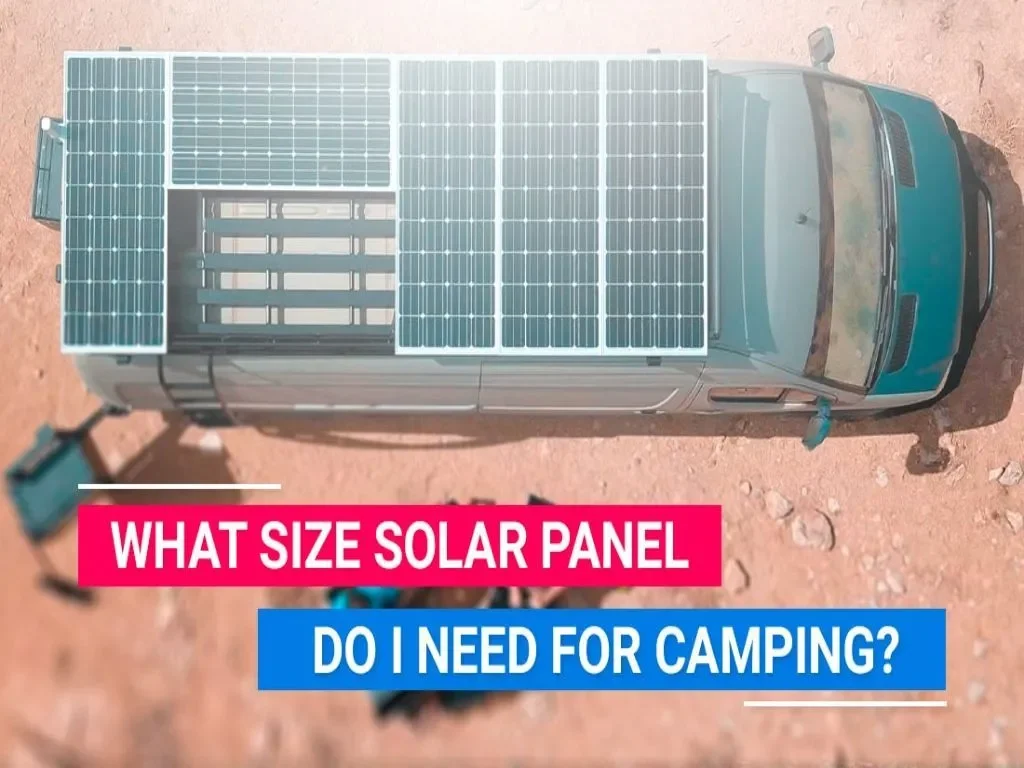
Source: Medium
Considering these factors, scaling up to more than 40 watts can be necessary if you’re hosting a big gathering and each person has a few gadgets that need to be charged. However, you’ll definitely need a 120-watt or 160-watt solar panel if you want to power anything like a camping fridge.
The most suitable solar panels for camping are those that are portable and lightweight. Compact and extremely efficient, monocrystalline solar panels are an excellent option. Moreover, foldable solar panels are advantageous because of their portability and simplicity of installation.
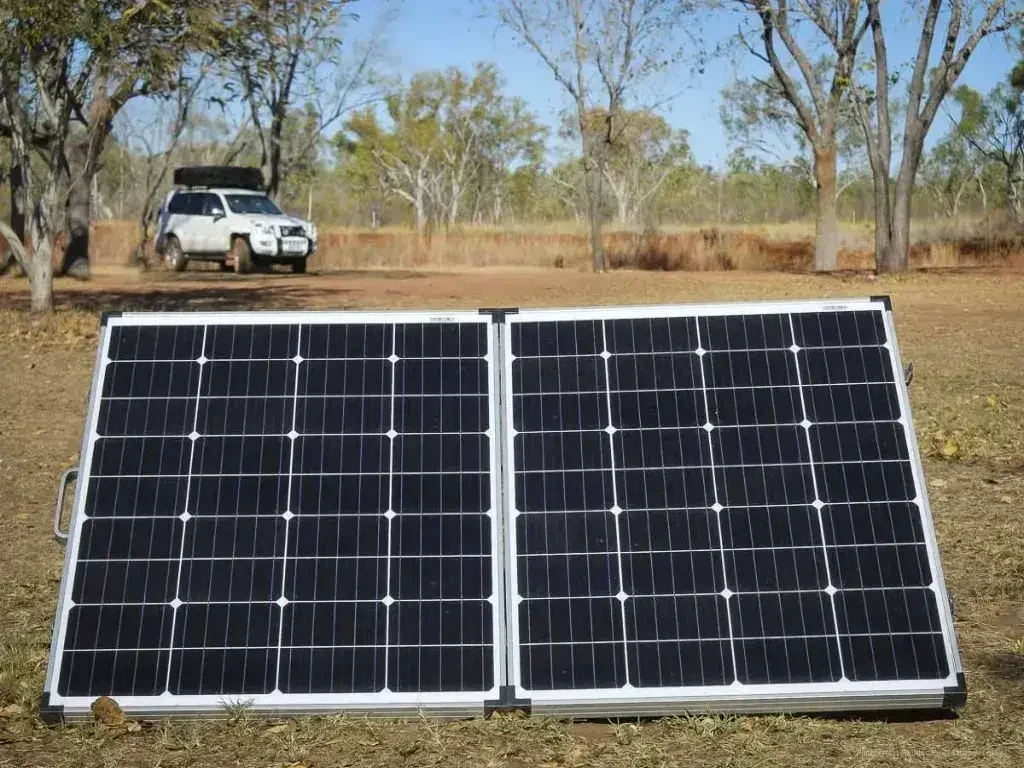
Source: 4WD Revolution
Always opt for solar panels with a slightly higher output than what your calculated requirements are. This results in days with reduced sunlight or elevated electricity consumption.
Having a dependable power source during your camping excursion is guaranteed by selecting the appropriate solar panel size and type, which will make the journey more enjoyable and less stressful.
Cost of Solar Panels for Camping
Counting on the model, dimensions, and efficacy of the panel, the price of solar panels intended for camping can fluctuate substantially. Consider the following pricing factors:
- The most prevalent form of solar panels utilized during camping is portable solar panels. Setting them up anywhere is simple. They are portable and lightweight. Portable solar panels are in the price range of $100 to $500. The Renogy 100 Watt 12 Volt Monocrystalline Portable Solar Suitcase, for instance, costs approximately $280.
- Foldable solar panels, as their name implies, are convenient for travelers with restricted storage space due to their ability to be folded and stored away when not in use. Numerous foldable solar panels are available for between $1.00 and $2.00 per watt.
- Solar panels, charge controllers, and occasionally batteries and inverters are typically included in solar panel kits. Pertaining to individuals seeking a comprehensive solution, they are ideal. Depending on the capacity and brand, solar panel systems for camping can cost between $100 and more than $1000.
- In the case of campervans or RVs, fixed solar panels are affixed permanently to the roofs. Not including installation expenses, fixed solar panels may cost between $300 and $3,000.
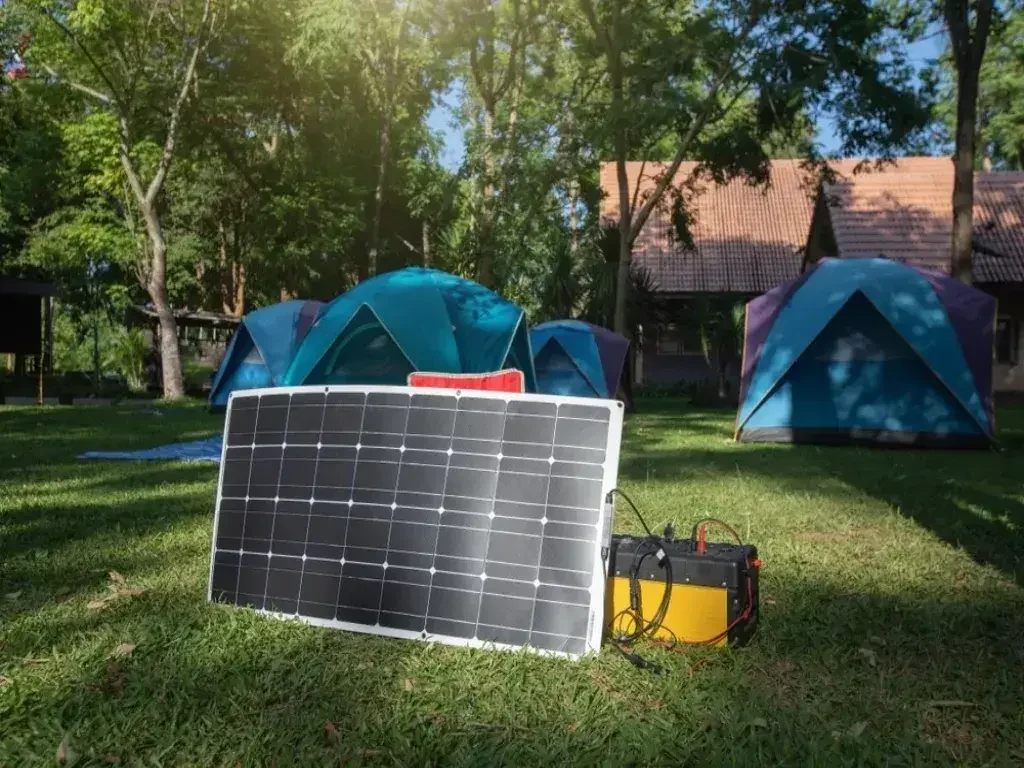
Source: SolarSME
Before making a purchase, it is essential to conduct research and reflect on factors such as portability, power capacity, and simplicity of installation. Camping excursions can be powered in an eco-friendly and economical manner with the proper solar panels.
Pros & Cons of Each Type of Solar Panels for Camping
Each category of solar panels designed for camping has its own set of merits and demerits, which are elaborated upon in the subsequent table.
Portable and designed for movement, portable solar panels frequently include carrying handles and built-in supports. Although they are simple to install and operate, their power output is typically lower than that of the other two varieties.
Flexible solar panels are lightweight and pliable, making them an excellent choice for campers seeking to conserve weight and space. In contrast, their susceptibility to physical harm generally results in a reduced lifespan.
Rigid solar panels possess greater longevity and are more robust and long-lasting. Typically constructed from tempered glass and aluminum, these objects possess exceptional resistance to severe weather conditions. Their heft, however, may be an inconvenience for campers who must frequently relocate.
The nature of your camping excursion and your particular requirements will largely dictate which solar panel you select. By carefully evaluating the advantages and disadvantages delineated in the table, one can arrive at a well-informed conclusion that corresponds to their camping aesthetic.
What Should I Consider When Choosing Solar Panels for Camping?
This section presents essential considerations for selecting the most optimal solar panels for camping purposes:
- Portability: the solar panel’s dimensions and mass are critical factors. It ought to be lightweight, compact, and simple to carry. Particularly, collapsible solar panels are those designed for hiking.
- Efficiency: the capacity of the solar panel to transform a given quantity of sunlight into electrical energy that is usable. With a greater efficiency rating, an equivalent quantity of sunlight will produce more energy.
- Durability: the solar panel ought to possess the capacity to endure a wide range of climatic conditions. Consider purchasing panels with a durable construction and water resistance to withstand the elements.
- Power output: the required power output is contingent upon the object being charged.
- Cost: although solar panels may require a substantial initial investment, they have the potential to yield long-term cost savings through decreased dependence on impermanent batteries and fuel-powered generators.
- Battery inclusion: certain solar panels feature an integrated battery capable of storing energy for periods of inactivity.
Gaining an understanding of these factors will enable you to select the most suitable solar panels for camping requirements in an informed manner. Bear in mind that the optimal decision will be contingent upon your particular needs and inclinations.
To Sum Up
Providing a sustainable, efficient, and practical energy source to meet a variety of camping necessities, solar panels for camping have, in summary, transformed the camping experience. To solve the specific needs of each camper, a variety of solar panel camper options are at one’s disposal, including monocrystalline, polycrystalline, and thin-film panels. Portability, efficacy, durability, power output, and cost should all be taken into account during the selection procedure.
Solar panels provide a sustainable power solution that enriches the camping experience for various types of campers, including backpackers in need of power to charge smartphones and families in RVs with larger appliances requiring electricity. Campers can guarantee a fruitful, environmentally conscious, and pleasurable camping experience by arming themselves with the appropriate information and deliberations to enable them to make an informed choice. Equip your camping setup with the proper solar panel to experience the serenity of nature without sacrificing contemporary conveniences.


